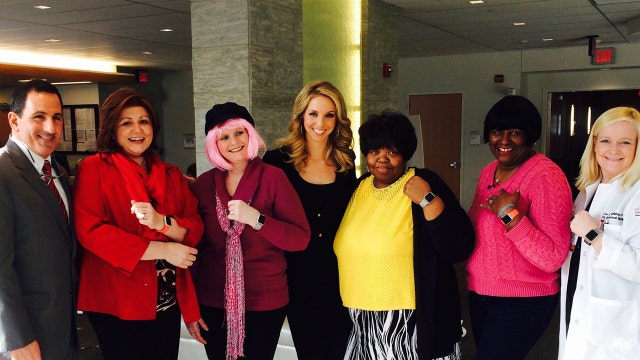How the Apple Watch Helps Cancer Patients in Treatment
Apple (NASDAQ:AAPL) CEO Tim Cook said it—the “Apple Watch is already changing lives and making days better for its users.”
And—it’s happening for breast cancer patients in Camden, New Jersey.
“For me it’s been like a companion because I felt all alone. I get inspiration from it,” says Linda Gaylord-Quann, who is currently undergoing chemotherapy for breast cancer.
Gaylord-Quann is one of 30 patients that volunteered to be part of a nine-month behavioral health study using an Apple watch to capture their every move throughout treatment.
The trial is being conducted at MD Anderson Cancer Center with an app called emPOWER, which was developed by Polaris Health, a behavioral health technology company in Wayne, PA.
“The app allows us to stay in touch with our patients while they’re in care at home and in the hospital by measuring their physical condition through the watch and their mental condition through a series of questions that we ask so we can get a more holistic view of their health,” Mark Anthony, CEO of Polaris Health, tells FOXBusiness.com.
Anthony says behavioral health isn’t typically something that gets fixed and they are hoping to change that.
“The analytics that we hope to get by working through emPOWER and having the medical data is to understand the chicken or the egg,” he adds. “What came first—the mental illness or the physical illness. We’re hoping to change healthcare and break down silos."
Dr. Cori McMahon, Psy.D., Director of Behavioral Medicine at MD Anderson, says the idea is working so far.
“We’re finding that patients are really excited about the wearable technology,” she says. “Patients are not only able to track their activity level but also their mood and treatment side effects so they get to start seeing patterns in how their body and their mind is behaving throughout treatment.”
McMahon also says by connecting with her patients through the watch she is able to understand how to treat them better.
“If a patient rates her mood significantly low for a number of days, we’re able to push a little message to them asking if they're okay. Would you like to speak to someone? And, if the answer is yes, she can actually push a button on the watch that connects them to their medical team.”
Maureen Dructor and Susan Nurge, both breast cancer survivors, met on the app through its virtual support group that allows patients to connect with each other and give words of wisdom.
“You can give each other helpful tips and advice and just be someone to vent to. If you’re having a bad day sometimes all you want is to have someone hear what you’re saying,” says Dructor.
Nurge, who is now cancer free says she wished she got the app when she was first diagnosed in April of last year.
“After surgery there were days when I wanted to be in bed all day but this app made me get up and move,” she says. “I wished the trial started six months earlier so I could have tracked myself through chemotherapy.”
Anthony says the main reason they choose breast cancer patients in particular for the first study was simple.
“These women are super informed and motivated to get healthy. They’re motivated because they want to be there for their families.”
Ellen McMillian, who is about to get a double mastectomy, says the app and support from other patients has helped her prepare for the procedure.
”They let me know that you’re not alone. We’ve been through this. We got you girl.”
Polaris Health says the next step is primary care.
“We have also had a number of people asking us about using it for suicide,” adds Anthony.




















